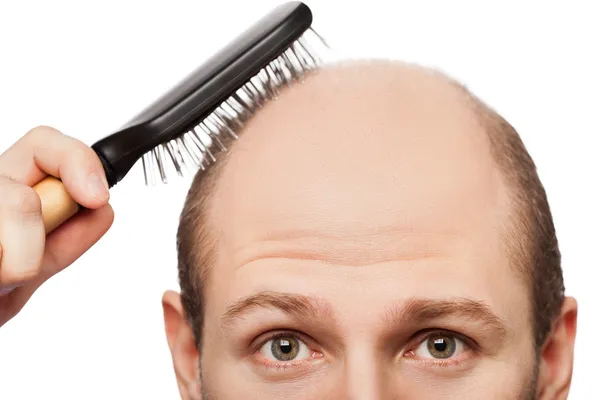Find out “Is Hereditary Baldness Preventable?” In the vast tapestry of human genetics, the strands of our lineage weave a complex narrative that extends beyond mere physical traits. Hereditary baldness is one such genetic fingerprint that leaves individuals pondering the age-old question: Can it be prevented? Delving into the intricacies of genetic predispositions and contemporary research, we embark on a journey to decipher the elusive nature of hereditary baldness prevention.
Unraveling the Genetic Code: The Prelude to Baldness
Hereditary baldness, colloquially known as male-pattern baldness or female-pattern baldness, is a hereditary condition that affects a significant portion of the global population. This condition manifests itself through a gradual and predictable pattern, often driven by the interplay of hormones and genetic factors.

The Genetic Culprit: Unruly Hair Follicles and Hormonal Havoc
At the core of hereditary baldness lies a genetic predisposition that influences the behavior of hair follicles. The term “androgenetic alopecia” encapsulates the genetic and hormonal factors that orchestrate the gradual thinning of hair and eventual balding. It’s a dance between genes and hormones, with dihydrotestosterone (DHT) playing a central role.
DHT, a potent form of testosterone, interacts with susceptible hair follicles, leading to their miniaturization. This process, scientifically termed as follicular miniaturization, results in thinner and shorter hair strands. Over time, affected follicles may cease to produce visible hair, paving the way for the emergence of the classic receding hairline or bald spot.
The Inheritance Quandary: Decoding Genetic Transmission
Hereditary baldness doesn’t play by uniform rules when it comes to inheritance. While it’s often associated with the maternal side of the family, the genetic web is intricate. Multiple genes are believed to contribute to this condition, making the inheritance pattern more nuanced. Understanding the heritability of hereditary baldness is akin to deciphering a genetic riddle with various chapters yet to be unveiled.
Current Frontiers in Hereditary Baldness Prevention Research
As science progresses, so does our ability to confront the genetic mysteries that shape our existence. Contemporary research is peeling back the layers of hereditary baldness prevention, offering glimmers of hope to those seeking to defy their genetic destiny.
1. Genetic Therapies: Editing the Blueprint
The advent of CRISPR technology has opened doors to unprecedented possibilities in the realm of genetic therapies. Scientists are exploring the potential of editing the genetic code responsible for hereditary baldness. Imagine a future where the very roots of baldness are edited out, rewriting the genetic script for generations to come.
2. Hormonal Interventions: Balancing the Equation
Understanding the intricate interplay of hormones in hereditary baldness, researchers are delving into hormonal interventions. By modulating hormonal levels or blocking the action of DHT, scientists aim to disrupt the cascade of events leading to hair follicle miniaturization. This avenue holds promise as a proactive measure to prevent or delay the onset of hereditary baldness.
READ RELATED: A winter of the mind: how to escape survival mode
3. Regenerative Medicine: Breathing Life Into Follicles
Regenerative medicine is emerging as a beacon of hope for those grappling with the ramifications of hereditary baldness. Stem cell therapy and hair follicle regeneration are captivating fields of study. Imagine a future where dormant follicles are awakened, breathing life into barren patches and reversing the relentless march of baldness.
Lifestyle Factors and Hereditary Baldness Prevention
While genetic die may seem cast, lifestyle factors exert a considerable influence on the manifestation and progression of hereditary baldness. Embracing a holistic approach that addresses both genetic predispositions and lifestyle choices can potentially tip the scales in favor of prevention.
1. Nutritional Foundations: Feeding Your Follicles
The adage “you are what you eat” holds profound implications for hereditary baldness prevention. Nutrient-rich diets, fortified with vitamins and minerals essential for hair health, can provide a supportive environment for follicular vitality. Omega-3 fatty acids, biotin, and antioxidants are among the key players in this nutritional symphony.
2. Stress Management: Taming the Cortisol Beast
Stress, both physiological and psychological, is a formidable adversary in the battle against hereditary baldness. Elevated cortisol levels, induced by chronic stress, can exacerbate hair loss. Incorporating stress management techniques, be it through meditation, yoga, or mindfulness, can potentially mitigate the impact of stress on hair follicles.
3. Scalp Care Rituals: Nurturing the Root
The scalp is the fertile ground from which hair sprouts, and its health is pivotal in the quest for hereditary baldness prevention. Regular scalp massages, proper cleansing, and the use of specialized hair care products can create an environment conducive to optimal hair growth, potentially slowing down the progression of hereditary baldness.
The Road Ahead: Navigating the Landscape of Hereditary Baldness Prevention
As we stand at the crossroads of genetics, science, and lifestyle, the pursuit of hereditary baldness prevention unfolds as a multifaceted journey. From unlocking the secrets of our genetic code to embracing proactive lifestyle choices, the path ahead is illuminated by the collective efforts of researchers, scientists, and individuals seeking to defy their genetic destiny.
In conclusion, while the question “Is hereditary baldness preventable?” lacks a definitive answer at present, the ongoing strides in genetic research, therapeutic interventions, and lifestyle modifications instill a sense of optimism. The tapestry of our genetic heritage may be complex, but the threads of possibility are woven into the very fabric of our existence. The quest for hereditary baldness prevention continues, a narrative still being written in the language of genes and the choices we make.










